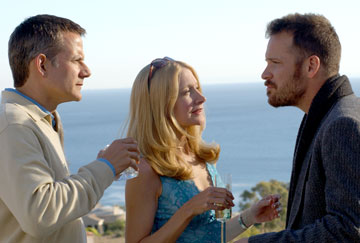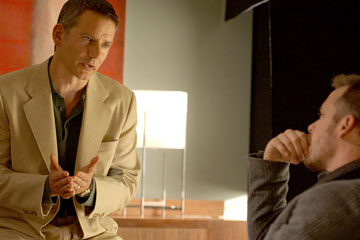

One of the big problems with plays adapted into movies is that they often retain a very artificial feel to it. On a stage, the audience can focus completely on a performance because there is not as much extraneous information. In a movie, the filmmaker has other things at his/her disposal. When filmmakers do not take advantage of the medium, it simply feels like a play translated to the big screen. The Dying Gaul feels like a filmed play. It would probably be absorbing on a stage, but seems extremely rigid and talky, more suited the other medium.
The Dying Gaul is a movie with three people all trying to manipulate each other. Jeffrey (Campbell Scott, Duma, Saint Ralph) is an executive at a movie studio. He wants to buy Robert Sandrich's screenplay The Dying Gaul. Sandrich (Peter Sarsgaard, Jarhead, Flightplan) based the screenplay partially on his life, and the death of his lover. There is one catch - Jeffrey wants to change the gender of the lover. After all, a film would be much more commercial if the lovers were heterosexual instead of homosexual.
Part of the film lies with Sandrich's dilemma. Jeffrey insists that the ideas and themes of the film will stay intact; he just wants the gender of one character to change. He is willing to pay Sandrich one million dollars, with which Sandrich can write many more screenplays about whatever he wants to. Sandrich reluctantly agrees, and this potentially interesting story goes by the wayside. Instead, writer/director Craig Lucas (The Secret Lives of Dentists, Reckless) introduces Jeffrey's wife Elaine (Patricia Clarkson, Good Night, and Good Luck, Miracle). Elaine takes an instant liking to Sandrich, and helps him to feel more at home while he works on the script with Jeffrey.
But this is all superficial. Elaine is by far the vilest person amongst the three. She goes on line and begins corresponding with Sandrich without telling him who she really is. Worse, she pretends to be somebody close to him, and essentially plays mind games with him. While is does add a sense of tension, it is missing a "why." Why does Elaine do this in the first place? What is her purpose in doing so? Each of the three is holding secrets from at least one other person, and this snooping brings the secrets out in the open. It also gives the three lots of tense acting, but it feels like acting for acting's sake rather than an organic outgrowth of the script. Scott, Clarkson, and Sarsgaard are all good actors, and watching them is essentially the only reason to see this movie. They each have their little incisive monologues, but The Dying Gaul gets so wrapped up in its characters lies that it does what no movie should do - becomes dull.